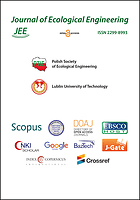
Journal of Ecological Engineering
Scope & Guideline
Innovating Ecological Practices for a Sustainable Future
Introduction
Aims and Scopes
- Environmental Monitoring and Assessment:
This area includes studies that evaluate water, soil, and air quality, utilizing various methodologies such as remote sensing, chemical analysis, and ecological modeling. - Wastewater Treatment Technologies:
Research in this scope focuses on developing and optimizing biological, chemical, and physical methods for treating wastewater, including the use of constructed wetlands and bioreactors. - Sustainable Agriculture and Soil Management:
This encompasses research on the impact of agricultural practices on soil health, crop yield, and the use of organic amendments like biochar and compost to improve soil properties. - Bioremediation and Pollution Mitigation:
Papers often investigate the use of biological systems to remove contaminants from the environment, highlighting innovative approaches to cleaning polluted sites. - Renewable Energy and Resource Recovery:
This includes exploring the potential of biogas production, waste-to-energy processes, and the utilization of agricultural and industrial waste as renewable resources. - Ecological Restoration and Conservation:
Research focusing on restoring degraded ecosystems, enhancing biodiversity, and implementing conservation strategies to protect natural habitats.
Trending and Emerging
- Climate Change Adaptation and Mitigation:
Recent publications increasingly address the impacts of climate change on ecosystems and propose engineering solutions for adaptation and resilience, reflecting the urgency of this global challenge. - Microplastics Research:
There is a growing emphasis on understanding the sources, impacts, and mitigation strategies for microplastics in various environments, indicating heightened awareness of plastic pollution. - Innovative Biotechnological Solutions:
Research on novel biotechnological applications, such as the use of microbial communities for bioremediation and waste treatment, is gaining traction, showcasing innovation in ecological engineering. - Smart Environmental Monitoring Technologies:
Emerging studies utilize advanced technologies like IoT and machine learning for real-time environmental monitoring and data analysis, reflecting a trend towards integrating technology in ecological engineering. - Ecosystem Services and Biodiversity Enhancement:
There is an increasing focus on understanding and enhancing ecosystem services, with research highlighting the importance of biodiversity in promoting ecological balance and resilience.
Declining or Waning
- Traditional Waste Management Practices:
Research related to conventional waste management techniques, such as landfilling and incineration, has decreased as the focus shifts toward more sustainable and innovative solutions. - Chemical Pollution Studies:
There has been a noticeable reduction in studies solely focused on chemical pollution without integrating ecological solutions, reflecting a trend towards holistic approaches to environmental issues. - Single-Focus Agricultural Practices:
Research centered on conventional agriculture without ecological considerations has waned, as more papers emphasize sustainable and integrated agricultural practices.
Similar Journals
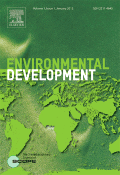
Environmental Development
Empowering scholars to influence impactful environmental strategies.Environmental Development is a premier academic journal published by Elsevier, dedicated to advancing the field of environmental science through interdisciplinary research and innovative practices. With a focus on geography, planning, and development, as well as management, monitoring, policy, and law, this journal provides a rigorous platform for scholars and practitioners to share insights that shape sustainable environmental policy and practice. Holding a prestigious Q1 ranking in both relevant categories and boasting impressive Scopus rankings - 62 out of 821 in Geography and 60 out of 399 in Environmental Science - Environmental Development stands out as a critical resource for those invested in the future of our planet. The journal emphasizes impactful research that addresses contemporary challenges, fostering dialogue across disciplines and geographical boundaries. With a commitment to high-quality research, it offers an important outlet for those aiming to influence environmental policy and developmental strategies globally. Join the growing community of researchers, professionals, and students engaged in promoting sustainable environmental practices through the knowledge shared in this esteemed publication.
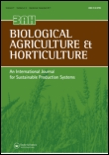
BIOLOGICAL AGRICULTURE & HORTICULTURE
Advancing sustainable practices in agriculture and horticulture.Biological Agriculture & Horticulture, published by Taylor & Francis Ltd, stands as a pivotal journal in the realms of agronomy and horticultural sciences. With an ISSN of 0144-8765 and an E-ISSN of 2165-0616, this esteemed journal has been disseminating vital research since its inception in 1982 and continues to publish leading studies through 2024. It currently boasts a commendable Q2 quartile ranking in both Agronomy and Crop Science as well as Horticulture, placing it in a prominent position within the academic community. With Scopus rankings indicating a 70th percentile in Horticulture and a 62nd percentile in Agronomy and Crop Science, the journal is a key resource for researchers, professionals, and students focused on innovative practices and scientific advancements in biological agriculture. While the journal is not open access, it remains an invaluable repository for cutting-edge research, methodologies, and reviews that push the boundaries of agricultural and horticultural sciences.

Frontiers of Environmental Science & Engineering
Catalyzing change through innovative environmental insights.Frontiers of Environmental Science & Engineering is a premier journal published by HIGHER EDUCATION PRESS that stands at the forefront of interdisciplinary research in environmental science and engineering. Established in 2013 and converging its scope through 2024, this journal has swiftly ascended to a notable Q1 category in the Environmental Science (Miscellaneous) segment, highlighting its remarkable impact and relevance. With a Scopus ranking of 27 out of 233 in its field, placing it within the top 88th percentile, it serves as a crucial platform for disseminating cutting-edge research, innovative methodologies, and pressing environmental concerns. Researchers, professionals, and students alike will find valuable insights and opportunities for collaboration within its pages. While the journal operates under a subscription model, its commitment to advancing the field makes it an essential resource for those dedicated to addressing the world's environmental challenges, fostering sustainable practices, and pioneering engineering solutions.

APPLIED ECOLOGY AND ENVIRONMENTAL RESEARCH
Exploring the vital connections between ecology and our environment.Applied Ecology and Environmental Research is a distinguished journal published by ALOKI Applied Ecological Research and Forensic Inst Ltd, located in Hungary. Since its inception in 2003, the journal has provided a pivotal platform for the dissemination of innovative research and discussions pertaining to applied ecology and its intersection with environmental sciences. With its ISSN 1589-1623 and E-ISSN 1785-0037, the journal boasts a respectable presence, achieving a Q3 ranking in Agronomy and Crop Science and a Q4 ranking in Ecology, Evolution, Behavior, and Systematics as of 2023. This reflects its commitment to publishing high-quality research that is vital for advancing knowledge in these fields. While it primarily operates under a subscription model, authors and institutions are encouraged to contribute meaningful research that sparks dialogue and fosters collaboration among a diverse range of stakeholders in ecological research. Researchers, professionals, and students alike will find valuable insights and contributions that address contemporary environmental challenges and promote sustainability. Join the community of scholars who are shaping the future of ecology and environmental research through this impactful publication.
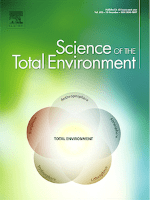
Science of The Total Environment
Uncovering Solutions for a Healthier PlanetScience of The Total Environment, an esteemed journal published by Elsevier, holds a significant position in the field of environmental science, encompassing critical areas such as Environmental Chemistry, Environmental Engineering, Pollution, and Waste Management and Disposal. With an impressive impact factor and ranked in the Q1 quartile across its categories for 2023, the journal is recognized for its high-quality research output and contribution to environmental sustainability. Operating from its base in the Netherlands, the journal has been a valuable resource since its inception in 1972, welcoming innovative studies that address complex environmental challenges. Its notable rankings—such as Rank #9 in both Environmental Sciences and Pollution—underscore its relevance and influence in the academic community. Although the journal currently does not provide an open access option, the robust findings and discussions presented within its pages continue to foster a deeper understanding of environmental issues. Science of The Total Environment is an essential platform for researchers, professionals, and students dedicated to advancing knowledge and solutions in the rapidly evolving field of environmental science.
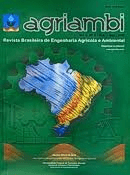
Revista Brasileira de Engenharia Agricola e Ambiental
Fostering Excellence in Agricultural and Environmental ResearchRevista Brasileira de Engenharia Agricola e Ambiental, published by the Universidade Federal de Campina Grande, serves as a pivotal platform for researchers and professionals in the fields of agricultural and biological sciences, agronomy, and environmental engineering. With an open-access policy since 2000, this journal aims to foster global dissemination of innovative research and practices, ensuring that high-quality findings are accessible to all. Operating in Brazil, it holds notable rankings, including Q2 in the categories of Agricultural and Biological Sciences (miscellaneous) and Agronomy and Crop Science, indicating its strong academic impact and influence within these fields. As of 2023, it ranks #68 out of 193 in Agricultural and Biological Sciences and #188 out of 406 in Agronomy and Crop Science, representing its commitment to advancing scientific knowledge. The journal primarily focuses on publishing studies that address challenges in agricultural engineering and environmental sustainability, making it an essential read for students, researchers, and professionals who are dedicated to innovation and excellence in these dynamic fields.
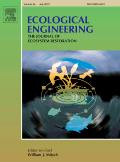
ECOLOGICAL ENGINEERING
Shaping policies and practices for ecological resilience.ECOLOGICAL ENGINEERING, published by Elsevier in the Netherlands, is a leading journal dedicated to advancing the field of environmental engineering and sustainable development. With an impressive impact factor and recognized as Q1 in multiple categories including Environmental Engineering, Management, Monitoring, Policy and Law, as well as Nature and Landscape Conservation, this journal stands at the forefront of environmental science research. It ranks among the top publications in its fields according to Scopus, reinforcing its significance with a notable position within the 90th percentile for Nature and Landscape Conservation. ECOLOGICAL ENGINEERING encourages open discourse and dissemination of innovative practices aimed at addressing contemporary ecological challenges, making it an essential resource for researchers, professionals, and students committed to sustainable practices and environmental stewardship. The journal’s comprehensive scope includes ecological restoration, habitat management, and policy implementation, ensuring a broad spectrum of relevant topics for its readership.
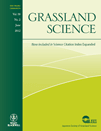
GRASSLAND SCIENCE
Transforming understanding of grassland ecosystems.GRASSLAND SCIENCE is a highly regarded journal published by Wiley that spans a diverse range of disciplines related to the study and management of grasslands. With its ISSN 1744-6961 and E-ISSN 1744-697X, this publication has established a firm footing within the academic community since its inception in 2009. Notably positioned in the Q2 quartile for Agronomy and Crop Science and Q3 quartiles for Ecology, Evolution, Behavior and Systematics and Plant Science, GRASSLAND SCIENCE aims to advance the understanding and sustainable management of grassland ecosystems, addressing critical issues such as biodiversity, land use, and climate change. Although the journal does not currently offer an open-access model, it provides comprehensive insights and research findings that are invaluable to researchers, professionals, and students engaged in agronomy, ecology, and environmental studies. With a commitment to fostering collaboration and innovation, GRASSLAND SCIENCE is a vital resource for those dedicated to enhancing the ecological and agricultural significance of grasslands worldwide.

ENVIRONMENTAL ENGINEERING SCIENCE
Transforming challenges into opportunities for environmental progress.ENVIRONMENTAL ENGINEERING SCIENCE is a leading journal published by MARY ANN LIEBERT, INC that provides a platform for pioneering research in the fields of environmental chemistry, pollution control, and waste management. With an ISSN of 1092-8758 and an E-ISSN of 1557-9018, this peer-reviewed journal aims to disseminate high-quality scientific studies that address critical environmental challenges. As evidenced by its 2023 category quartile rankings, it holds a notable position at Q3 in Environmental Chemistry and Pollution and Q2 in Waste Management and Disposal, highlighting its relevance and impact in these domains. Spanning over two decades from 1997 to 2024, the journal is dedicated to fostering innovations and promoting rigorous scholarship that can contribute significantly to sustainable environmental practices globally. Authors and researchers are encouraged to engage with this essential resource, which offers Open Access options to enhance the visibility and reach of their work. For those interested in advancing their understanding and practice within the environmental sciences, ENVIRONMENTAL ENGINEERING SCIENCE is an indispensable journal to consider.
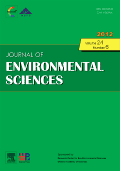
Journal of Environmental Sciences
Advancing Environmental Knowledge for a Sustainable FutureJournal of Environmental Sciences, published by SCIENCE PRESS, is a premier scholarly journal dedicated to advancing knowledge in the multidisciplinary fields of environmental science, environmental chemistry, and environmental engineering. Established in 1970 and based in Beijing, China, this journal has consistently garnered recognition for its high-quality research, demonstrated by its Q1 rankings across multiple categories, including Environmental Chemistry, Environmental Engineering, and General Environmental Science. With an impressive Scopus rank of #11 for Environmental Science, the journal has firmly positioned itself within the top tier of its field, attracting contributions from leading researchers and academics worldwide. Although it operates under subscription access, the journal's commitment to disseminating critical insights into pressing environmental issues makes it an invaluable resource for professionals, researchers, and students striving to make impactful contributions to the understanding and management of environmental challenges.